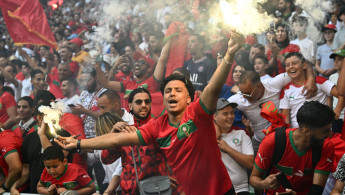Paris Olympics: French mayor closes Moroccan fan zone over politicised 'Moroccan Sahara' performance
A French mayor shut down a Moroccan fan zone at the Olympics following a performance that praised a "pro-Moroccan" position regarding the Western Sahara, just as the political class in Paris is engrossed in a political tug-of-war over President Emmanuel Macron's recent shift that support Rabat's control over the disputed territory.
On 1 August, Moroccan Sahrawi singer Saida Charaf performed her signature song "Mani," a traditional Sahrawi-inspired chant, to Moroccan fans at the Olympics fan zone in L'Ile-Saint-Denis, France.
During the performance, she included a tribute to "Moroccan Sahara" and praised Macron for his recent endorsement of Rabat's autonomy plan for the Western Sahara, meaning to absorb it "within the Moroccan sovereignty."
Following Charaf''s performance, Mohamed Gnabaly, the mayor of L'Ile-Saint-Denis, took the stage and announce that the performance breached the "neutrality" and "non-political" rules of the fan zone.
Wearing a Morocco jersey, Gnabaly struggled to be heard over loud boos and chants of "Moroccan Sahara" from the crowd.
In response to what he deemed "inaction" and "lack of excuses" from Moroccan representatives, the leftist-oriented mayor decided to close the Moroccan zone over the weekend.
The city announced Sunday, 4 August, the termination of its lease agreement with the Moroccan embassy for the Station Afrique site–a fan zone dedicated to celebrating African athletes, artists, and cultures during the Olympics and Paralympics.
Infighting within French politics
The Moroccan consulate has condemned the move as "unilateral and arbitrary," arguing that singer's comments were a "spontaneous expression" of joy over Macron's decision and not a breach of the event's "neutrality".
On 30 July, Paris officially endorsed Morocco's autonomy plan for the disputed territory, declaring, "The present and future of Western Sahara fall within the framework of Moroccan sovereignty."
Both Morocco and the Algeria-backed Polisario Front claim sovereignty over the territory. The UN recognises neither.
Macron's new stance on Western Sahara has set off tensions within the French political elite. Left-wing parties, traditionally aligned with Algeria, have criticised Macron's decision as an "individual choice." Among them is Gnabaly's party, Les Écologistes (known as "The Greens").
Macron's party came second in the recent legislative elections. Thus, he is set to appoint a new Prime Minister from the New Popular Front (NFP)—the broad left-wing alliance that won the early elections in July.
Several commentators have likened Macron's decision to Trump's last-minute recognition of Rabat's sovereignty over Western Sahara. Trump made the move in his final days in office. Biden administration maintained the stance but did not fulfil its key promises, such as opening a consulate in the Sahara.
Macron's recognition has already unsettled the NFP, which is struggling under the pressure of selecting a new Prime Minister from the four-party left-green alliance.
The Socialist Party, the French Communist Party, and Les Écologistes—members of the NFP—have all expressed opposition to France's new position.
Meanwhile, La France Insoumise (LFI), the most influential party in the alliance, has yet to comment. Its leader, Jean-Luc Mélenchon, born in Tangier, Morocco, is known for his support of Moroccan sovereignty, unlike most of his party comrades.
Some members of the LFI have reacted individually, hinting at potential discord within the party and the alliance regarding taking a unified stance on the issue.




 Follow the Middle East's top stories in English at The New Arab on Google News
Follow the Middle East's top stories in English at The New Arab on Google News

![A group of Palestinians, foreign and Israeli activists gather to participated in an olive picking event on the land in the town of Battir, which is under threat of confiscation by Israel in Bethlehem, occupied West Bank on 8 November 2024. [Getty]](/sites/default/files/styles/image_330x185/public/2182930803.jpeg?h=199d8c1f&itok=__0LgGsa)
